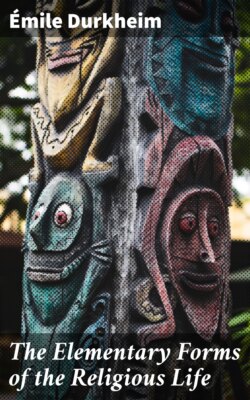The Elementary Forms of the Religious Life

Реклама. ООО «ЛитРес», ИНН: 7719571260.
Оглавление
Durkheim Émile. The Elementary Forms of the Religious Life
The Elementary Forms of the Religious Life
Table of Contents
INTRODUCTION SUBJECT OF OUR STUDY: RELIGIOUS SOCIOLOGY AND THE THEORY OF KNOWLEDGE
II
BOOK I. PRELIMINARY QUESTIONS
CHAPTER I DEFINITION OF RELIGIOUS PHENOMENA AND OF RELIGION[25]
I
II
III
IV
CHAPTER II LEADING CONCEPTIONS OF THE ELEMENTARY RELIGION I.—Animism
I
II
III
IV
V
CHAPTER III LEADING CONCEPTIONS OF THE ELEMENTARY RELIGION—continued II.—Naturism
I
II
III
CHAPTER IV TOTEMISM AS AN ELEMENTARY RELIGION History of the Question.—Method of Treating it
I
II
BOOK II. THE ELEMENTARY BELIEFS
CHAPTER I TOTEMIC BELIEFS The Totem as Name and as Emblem
I
II
III
CHAPTER II TOTEMIC BELIEFS—continuedThe Totemic Animal and Man
I
II
CHAPTER III TOTEMIC BELIEFS—continuedThe Cosmological System of Totemism and the Idea of Class
I
II
III
CHAPTER IV TOTEMIC BELIEFS—endThe Individual Totem and the Sexual Totem
I
II
CHAPTER V ORIGINS OF THESE BELIEFS Critical Examination of Preceding Theories
I
II
III
IV
V
CHAPTER VI ORIGINS OF THESE BELIEFS—continuedThe Notion of the Totemic Principle, or Mana, and the Idea of Force
I
II
III
IV
CHAPTER VII ORIGINS OF THESE BELIEFS—endOrigin of the Idea of the Totemic Principle or Mana
I
II
III
IV
V
VI
CHAPTER VIII THE IDEA OF THE SOUL
I
II
III
IV
V
VI
CHAPTER IX THE IDEA OF SPIRITS AND GODS
I
II
III
IV
V
BOOK III. THE PRINCIPAL RITUAL ATTITUDES
CHAPTER I THE NEGATIVE CULT AND ITS FUNCTIONS THE ASCETIC RITES
I
II
III
IV
CHAPTER II THE POSITIVE CULT I.—The Elements of the Sacrifice
I
II
III
IV
V
CHAPTER III THE POSITIVE CULT—continued II.—Imitative Rites and the Principle of Causality
I
II
III
CHAPTER IV THE POSITIVE CULT—continued III.—Representative or Commemorative Rites
I
II
III
CHAPTER V PIACULAR RITES AND THE AMBIGUITY OF THE NOTION OF SACREDNESS
I
II
III
IV
CONCLUSION
I
II
III
IV
INDEX
FOOTNOTES:
Отрывок из книги
Émile Durkheim
Published by Good Press, 2019
.....
In spite of the sense ordinarily attached to the name, the apriorists have more respect for the facts. Since they do not admit it as a truth established by evidence that the categories are made up of the same elements as our sensual representations, they are not obliged to impoverish them systematically, to draw from them all their real content, and to reduce them to nothing more than verbal artifices. On the contrary, they leave them all their specific characteristics. The apriorists are the rationalists; they believe that the world has a logical aspect which the reason expresses excellently. But for all that, it is necessary for them to give the mind a certain power of transcending experience and of adding to that which is given to it directly; and of this singular power they give neither explanation nor justification. For it is no explanation to say that it is inherent in the nature of the human intellect. It is necessary to show whence we hold this surprising prerogative and how it comes that we can see certain relations in things which the examination of these things cannot reveal to us. Saying that only on this condition is experience itself possible changes the problem perhaps, but does not answer it. For the real question is to know how it comes that experience is not sufficient unto itself, but presupposes certain conditions which are exterior and prior to it, and how it happens that these conditions are realized at the moment and in the manner that is desirable. To answer these questions it has sometimes been assumed that above the reason of individuals there is a superior and perfect reason from which the others emanate and from which they get this marvellous power of theirs, by a sort of mystic participation: this is the divine reason. But this hypothesis has at least the one grave disadvantage of being deprived of all experimental control; thus it does not satisfy the conditions demanded of a scientific hypothesis. More than that, the categories of human thought are never fixed in any one definite form; they are made, unmade and remade incessantly; they change with places and times. On the other hand, the divine reason is immutable. How can this immutability give rise to this incessant variability?
It is true that these rites are purely negative, but they do not cease being religious for that. Also there are others which demand active and positive services of the faithful, but which are nevertheless of the same nature. They work by themselves, and their efficacy depends upon no divine power; they mechanically produce the effects which are the reason for their existence. They do not consist either in prayers or offerings addressed to a being upon whose goodwill the expected result depends; this result is obtained by the automatic operation of the ritual. Such is notably the case with the sacrifice of the Vedic religion. "The sacrifice exercises a direct influence upon the celestial phenomena," says Bergaigne;[60] it is all-powerful of itself, and without any divine influence. It is this, for example, which broke open the doors of the cavern where the dawn was imprisoned and which made the light of day burst forth.[61] In the same way there are special hymns which, by their direct action, made the waters of heaven fall upon the earth, and even in spite of the gods.[62] The practice of certain austerities has the same power. More than that, "the sacrifice is so fully the origin of things par excellence, that they have attributed to it not only the origin of man, but even that of the gods. … Such a conception may well appear strange. It is explained, however, as being one of the ultimate consequences of the idea of the omnipotence of sacrifice."[63] Thus, in the entire first part of his work, M. Bergaigne speaks only of sacrifices, where divinities play no rôle whatsoever.
.....